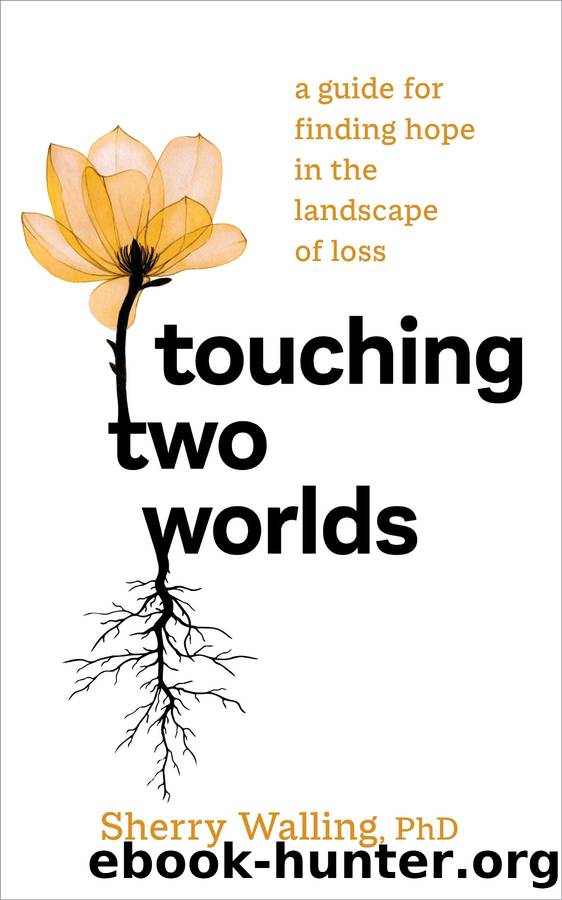Touching Two Worlds by Sherry Walling

Author:Sherry Walling [Walling, Sherry]
Language: eng
Format: epub
Tags: FAM014000 FAMILY & RELATIONSHIPS / Death, Grief, Bereavement, PSY052000 PSYCHOLOGY / Grief & Loss, SEL010000 SELF-HELP / Death
Publisher: Sounds True
Take a Moment . . .
Most of the people I know who have lost a brother or sister or son or cousin to addiction, experience some kind of premonition. Addiction and mental illness are a slow burn, but the unraveling is punctuated by moments of poignant, shocking clarity.
As you look back on your loss, are there ways that you âsaw it comingâ? How does your sense of premonition shape the loss for you?
Does the âknowingâ help? Does it help you feel more mastery over the story to see how the pieces fit together?
Or does the knowing become a tangle of responsibility and helplessness?
This is a difficult part of this story for me. The âknowingâ decreases the loudness of the shock, but it also creates a sense of helplessness and responsibility that weighs on me heavily. Like watching the unfolding of a car crash, I saw the series of events unfolding, and I knew they could create disaster, but there was nothing I could do to stop it. No one heard me yelling.
In the world of Western psychology, this kind of âknowingâ is often attributed to hindsight bias. It seems that humans tend to retroactively see events as having been predictable. Most traditional psychologists argue that hindsight bias is a kind of memory distortion.1 We feel the âknowingâ only at the end of the story, only after the disaster has imploded in front of us. Hindsight bias is the brainâs attempt to protect us from the unpredictability of the world. I knew that was going to happen protects us from the randomness of tragedy and the pain of our exquisite vulnerability. Our brains take comfort in patterns and predictability.
Seeing the through-line in the sequence of events that caused your loss might be helpful to you. It might help you see how the pieces fit together to form a cohesive story. It might help it make some sense. Dave died in an instant, but he had been dying for years, and that perspective is important to counterbalance some of the shock.
But be careful about how this retrospective clarity hooks you into a feeling of knowing, when, in reality, you could not really have known. It is entirely possible that the story could have gone another way. Be gentle with the part of you that is grasping for predictability and clarity. Be gentle with the part of you that was holding out hope for a different outcome.
Download
This site does not store any files on its server. We only index and link to content provided by other sites. Please contact the content providers to delete copyright contents if any and email us, we'll remove relevant links or contents immediately.
| Grief & Bereavement | Hospice Care |
| Pet Loss | Suicide |
They Both Die at the End by Adam Silvera(9818)
Thirteen Reasons Why by Jay Asher(8909)
The Space Between by Michelle L. Teichman(6939)
Suicide Notes by Michael Thomas Ford(4827)
Tuesdays with Morrie by Mitch Albom(4784)
Suicide: A Study in Sociology by Emile Durkheim(3022)
The Checklist Manifesto by Atul Gawande(2852)
Tuesdays With Morrie by Mitch Albom(2761)
In the Woods by Tana French(2598)
Bossypants by Tina Fey(2531)
Robin by Dave Itzkoff(2440)
Olive Kitteridge by Elizabeth Strout(2370)
No Ashes in the Fire by Darnell L Moore(2333)
Reservoir 13 by Jon McGregor(2302)
End of Days by Sylvia Browne(2187)
All Things New by John Eldredge(2161)
Bus on Jaffa Road by Mike Kelly(2159)
Scar Tissue by Anthony Kiedis(2135)
No Time to Say Goodbye(2116)
